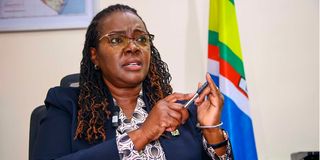4,000 cases monthly: The hidden face of Kenya's GBV tragedy

Anne Wang'ombe, the Principal Secretary in the State Department for Gender and Affirmative Action during an interview at her office in Teleposta Towers, Nairobi on November 5, 2024. She says the government is adopting HIV/Aids campaign strategy in war against femicide.
What you need to know:
- Kenya has recorded 97 femicide cases in the past three months, including the brutal murder of a woman, her daughter, and niece.
- The government is launching a national campaign modeled after the successful HIV/Aids awareness campaigns of the 1990s.
- The initiative brings together stakeholders, from government agencies to community leaders, while President Ruto has promised to strengthen police capacity to combat the crisis.
- The Nairobi Women Hospital reports receiving about 4,000 GBV cases monthly.
The bodies were found in three different locations. A mother, her daughter, and her niece - all killed in a similarly brutal manner, their remains scattered across the Nairobi Metropolitan area like pieces of a horrifying puzzle that has become all too familiar in Kenya.
Waris Daud, her 21-year-old daughter Amina Abdirashid, and 12-year-old niece Nuseiba Dahir had been reported missing before their mutilated bodies were discovered - one in Parklands, another in Bahati, and Waris's remains in a bush in Machakos. Their deaths added three more names to a growing list of women and girls whose lives have been brutally cut short in what experts are now calling Kenya's femicide crisis.
The numbers are staggering. According to Deputy Inspector General (DIG) of Police Eliud Lagat, law enforcement has recorded 97 femicide cases in just the past three months. That's roughly one woman killed every day.
At the Nairobi Women Hospital's gender violence recovery centres, the situation is equally grim, with approximately 4,000 gender-based violence (GBV) cases reported monthly.

The Nairobi Women’s Hospital Group chief executive officer Dr Sam Thenya in this file photo. He reveals that the gender violence recovery centres that the hospital run, record an average of 4,000 GBV cases per month.
"It is a crisis, and something definitely needs to be done," says Dr Sam Thenya, CEO of Nairobi Women Hospital. "The economic burden of gender-based violence is enormous on our economy. We must speak against this vice being perpetuated against women and girls. They are our daughters, wives, sisters, and mothers."
National campaign
In response to the escalating crisis, the government is taking unprecedented action. Gender and Affirmative Action Principal Secretary Anne Wang'ombe has announced plans for a national campaign modelled after the successful HIV/Aids awareness campaigns of the 1990s and early 2000s.
"Support systems for victims is paramount," Anne tells Nation.Africa.
"We recognise the urgent need to establish and improve support systems, including shelters, counselling services, and legal assistance for victims of violence. We also need to improve our data collection on femicide and gender-based violence to inform policy decisions and track progress effectively."
The initiative emerged from a crucial meeting that brought together government agencies, civil society organisations, faith-based groups, development partners, law enforcement, and community leaders. The discussions focused on addressing root causes, including societal norms, economic disparities, and inadequate legal protections.
President William Ruto has also waded into the crisis, attributing the rise in femicide cases to a combination of moral decay and criminal activity. Speaking, two weeks ago, at the African Divine Church in Nairobi, he expressed deep concern about the growing number of Kenyan women who, expecting love and respect from their partners, have become victims of brutal violence and murder.
"I want to assure you that we will go out of our way to equip our police to deal with this challenge," President Ruto promised, committing to strengthen law enforcement capabilities.
Including men
The crisis has sparked outcry from various sectors of society. Leah Sankaire, Kewopa Chairperson and Kajiado Woman Representative, expresses frustration at the pace of response: "The government, parliament, and all other relevant stakeholders do little to contain this menace. We need to see action and perpetrators being brought to book. Femicide has reached a national crisis, and as we know, justice delayed is justice denied."

Leah Sankaire, Kewopa chairperson and Kajiado Woman Representative. She has expressed frustration at the pace of response on femicide cases.
Action Aid's Susan Otieno advocates for practical solutions, suggesting the creation of a public register of femicide perpetrators. Meanwhile, boy child advocate Faith Nashipae emphasises the importance of including men and boys in prevention efforts.
"We need to look at men as femicide prevention allies," Nashipae explains. "It's paramount that we examine what we're instilling in our boys and empower them. There is also the need to take GBV education to schools and have the church get involved in fighting gender-based violence."
Even boda boda operators are joining the fight. James Kariuki, who operates in Juja, speaks passionately about the issue: "As a father of girls and a brother to several sisters, I feel very worried about the ongoing trend of femicide. We must do all that it takes to slay this dragon. It is important that we have a society that is safe for all, including girls and women."
Way forward
The upcoming campaign will coincide with the 16 Days of Activism against gender-based violence, incorporating certified counsellors to support survivors and affected families. Law enforcement is also stepping up its response, with DIG Lagat confirming that many cases are under active investigation and some perpetrators have already been charged in court.
"I want to assure Kenyans that all perpetrators of femicide will face the full force of the law," says Lagat.
"I also urge Kenyans to share information with the police that may lead to apprehending the culprits of these heinous acts. The police cannot deal with matters alone but in partnership with other Kenyans."
UN Women has called on the government to invest in proven strategies to prevent violence against women and address the impunity often associated with these cases. As the nation grapples with this crisis, the message is clear: protecting Kenya's women and girls requires not just government action, but a fundamental shift in societal attitudes and behaviours.





